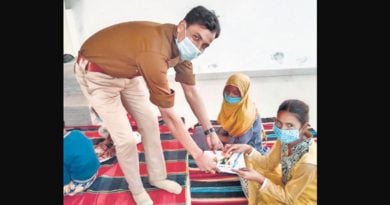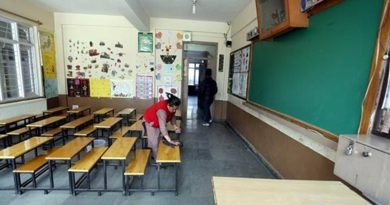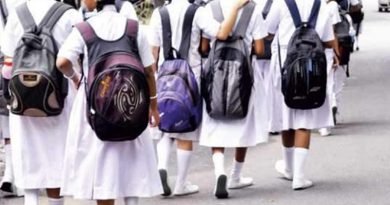With WhatsApp and video texts, learning takes a new form in Delhi govt schools
New Delhi: A month after the Delhi government announced a semi-online model of education for its students amid the Covid-19 pandemic, with an increased focus on student-teacher interaction, teachers and principals across the capital are going the extra mile to ensure that they cover as many students as possible.

On July 2, the government had announced that in the wake of the digital divide, students of 1,030 government schools in the capital will engage in “learning with a human feel” and have an increased interaction with their teachers over phone.
CS Verma, principal of Kautilya Government Sarvodaya Bal Vidyalaya in Chirag Enclave, said the school has been trying to maximise their reach and approach as many students as they can. “We have roped in school management committee members to send hard copies of worksheets to those parents who can’t collect it from school. We have also reached out to parents and tried to coordinate online classes when they are at home so that children can access their phones,” he said.
Deputy chief minister Manish Sisodia has also been interacting with parents and reviewing the semi-online model. The education minister has visited eight districts so far. On Tuesday, the education minister visited Kautilya SBV and analysed the data from 32 schools in the south-east zone. Around 17% of students from these schools could not be traced in the wake of the lockdown. The education minister had told HT in an interview that the overall figure for schools across Delhi lies in the range of 10-15%.
“These numbers keep fluctuating because we have been assessing weekly numbers of different zones. Trends indicate that class 6 students constitute a large segment of students who cannot be traced. This is mostly because they have transferred to Delhi government schools from municipal corporation schools and the data is not updated. We have asked schools to get in touch with MCD schools and track these students. A study of socio-economic backgrounds and other factors can help us come up with a system to help these students as well,” he said.
“While academic losses cannot be completely covered up, it can be mitigated through the efforts of teachers and stakeholders,”Sisodia said.
Aparna Pandita, who teaches biology to class 12 students at Veer Savarkar Sarvodaya Kanya Vidyalaya in Kalkaji, said in addition to videos and worksheets, teachers often use the voice notes feature on WhatsApp. “Students can send us their queries and then we explain the concept in a voice note. It’s more instantaneous and convenient. The feature allows us to check who has seen the audio and who has played it. Teachers can now reach out to students who didn’t play the audio to find out the issues and then address them,” Pandita said.
The interim class teacher also said several students across classes had moved out of Delhi to other states, leaving teachers with a different sets of problems to deal with.
For instance, class 12 student Jyoti Yadav, a resident of south Delhi’s Govindpuri, moved to her village near Patna in Bihar following the lockdown. “We could not pay rent in Delhi and our family decided to relocate temporarily,” Yadav, who left Delhi last month, said.
“The internet connection in our village is very poor. My brothers use the phone for nearly four hours, and by the time I get it, there is no battery charge left. The electricity supply is also intermittent and so I cannot charge the phone, This means I can’t attend my classes regularly. I have to resort to self-study whenever I get the chance,” Yadav, an engineering aspirant who studies at Veer Savarkar SKV, said.
Pandita said she has spoken to Yadav’s father multiple times asking him to prioritise her education over their younger children. “This is her final year and hence most crucial. We have told them that if she doesn’t attend her classes, there is a chance that her name may be struck off the rolls. Her parents have assured us that they will let er use the phone more,” she said.
Class 9 student Risha, who is currently in Bangarmau near Kanpur, began this academic year at her new school in Kalkaji through the online mode. “Our class teacher tried to arrange video conferencing sessions so that we would get acquainted with one another. But many of us could not connect because of internet issues,” she said. “Teachers are recording their own videos and sending them to us on WhatsApp. We enjoy the lessons when we understand it, write question and answers and send it back. But it gets frustrating when we can’t follow the lessons,” Risha said.

674,453 total views



